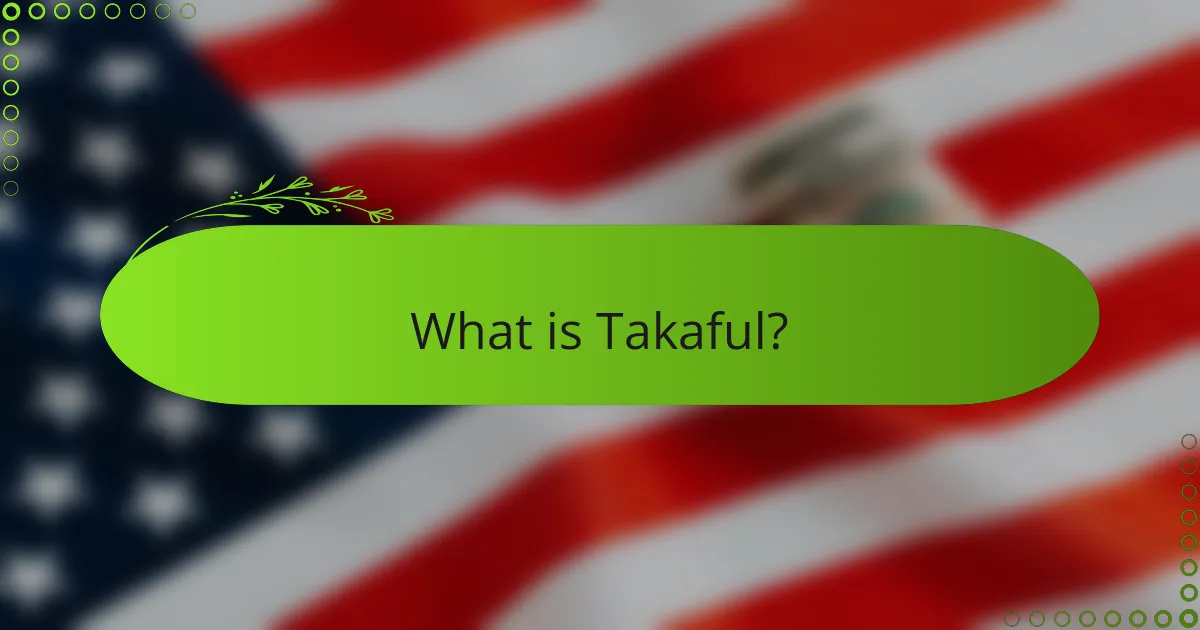
What is Takaful?
Takaful is a cooperative insurance system based on Islamic principles. It involves participants contributing money into a pooled fund. This fund is used to support members in times of need. Takaful operates on the principles of mutual assistance and shared responsibility. Participants agree to help each other financially in the event of a loss. The system is compliant with Sharia law, prohibiting elements like interest and uncertainty. Takaful has gained popularity in many Muslim-majority countries. It provides an ethical alternative to conventional insurance.
How does Takaful differ from conventional insurance?
Takaful differs from conventional insurance primarily in its underlying principles. Takaful is based on mutual cooperation and shared responsibility among participants. In contrast, conventional insurance operates on a risk transfer model where the insurer assumes the risk.
In Takaful, participants contribute to a pooled fund. This fund is used to support members in times of need. The concept aligns with Islamic finance principles, prohibiting interest and excessive uncertainty.
Conventional insurance often involves profit maximization for the insurer. Takaful, however, seeks to provide assistance to members while promoting ethical practices. The surplus from the Takaful fund may be distributed among participants.
These fundamental differences highlight the cooperative nature of Takaful compared to the transactional nature of conventional insurance.
What are the key principles that underpin Takaful?
The key principles that underpin Takaful are mutual cooperation, shared responsibility, and risk-sharing. Takaful operates on the basis of participants pooling their resources to support one another in times of need. This cooperative model is grounded in Islamic teachings that emphasize community support and social welfare.
Participants contribute to a common fund, which is used to provide assistance to those who face losses or claims. The principle of shared responsibility ensures that risks are collectively managed, promoting solidarity among members. Furthermore, Takaful adheres to the prohibition of interest (riba) and uncertainty (gharar), aligning with Islamic finance principles.
This framework fosters a sense of community and ethical investment, distinguishing Takaful from conventional insurance. The mutual support aspect is crucial, as it reflects the Islamic values of brotherhood and mutual aid.
Why is mutual assistance a foundational aspect of Takaful?
Mutual assistance is a foundational aspect of Takaful because it embodies the principles of cooperation and solidarity among participants. Takaful operates on the premise that members contribute to a common pool to support each other in times of need. This cooperative model aligns with Islamic values of mutual support and community welfare. The concept is rooted in the idea that participants share risks collectively, which enhances financial security for all involved. Historical practices of mutual aid in various cultures also reinforce the importance of this principle. By pooling resources, Takaful participants can provide financial assistance to those facing unexpected hardships. This mutual support system fosters a sense of community and trust among members.
What are the primary types of Takaful?
The primary types of Takaful are Family Takaful and General Takaful. Family Takaful provides life insurance coverage and savings benefits. It aims to support the financial needs of participants’ beneficiaries upon death or disability. General Takaful covers risks related to property, liability, and other non-life aspects. It protects participants against losses from events such as accidents, theft, or natural disasters. Both types operate on the principles of mutual cooperation and risk-sharing in accordance with Islamic law.
What distinguishes Family Takaful from General Takaful?
Family Takaful focuses on providing financial protection for families in the event of death or disability. General Takaful, on the other hand, covers a broader range of risks, including property and liability. Family Takaful operates on a mutual assistance principle, pooling contributions for the benefit of participants’ families. General Takaful involves risk-sharing among participants for various insurable events. The benefits of Family Takaful are typically paid out as lump sums to beneficiaries. In contrast, General Takaful claims are settled based on the loss incurred. Family Takaful is often structured to include savings and investment components. General Takaful is primarily designed for risk coverage without an investment element.
How do different models of Takaful operate?
Different models of Takaful operate through cooperative risk-sharing mechanisms. In the Wakalah model, participants pay a fee to a Takaful operator, who manages the fund and invests it. The operator earns a commission for their services. In the Mudharabah model, participants provide capital to the operator, who manages the fund. Profits are shared based on a pre-agreed ratio. The participants bear the risk of loss, while the operator’s income comes from profit-sharing. The Hybrid model combines elements of both Wakalah and Mudharabah, offering flexibility in management and profit distribution. Each model adheres to Sharia principles, ensuring compliance with Islamic finance guidelines.
What benefits does Takaful provide to participants?
Takaful provides several benefits to participants, including mutual protection, risk-sharing, and financial support. Participants contribute to a common pool, which is used to assist members in times of need. This system fosters community support and solidarity among participants. Takaful also promotes ethical investment, as funds are invested in Sharia-compliant ventures. Furthermore, Takaful plans often offer flexibility in coverage options. Participants can choose plans according to their needs and financial capabilities. Overall, Takaful encourages financial security and peace of mind for its members.
How does Takaful promote risk-sharing among members?
Takaful promotes risk-sharing among members through a cooperative insurance model. Members contribute to a common fund, which is used to support those who face losses. This fund is managed collectively, ensuring that risks are shared fairly. Each member’s contribution is based on their individual risk profile, aligning incentives for mutual support. The principle of solidarity is central to Takaful, fostering a sense of community among participants. Additionally, Takaful operates under Shariah principles, reinforcing ethical practices in financial dealings. This structure ensures that all members benefit from the collective pool, enhancing financial security and stability.
What are the financial advantages of participating in Takaful?
Participating in Takaful offers several financial advantages. First, it provides a risk-sharing mechanism that reduces individual financial burdens. Participants contribute to a pooled fund, which is utilized to support members in times of need. This collaborative approach enhances financial security among participants.
Additionally, Takaful operates on principles of mutual assistance and cooperation. This structure often leads to lower premiums compared to conventional insurance. Participants may also receive surplus funds if claims are lower than expected, promoting financial benefits.
Furthermore, Takaful investments are made in Sharia-compliant ventures. This alignment with Islamic principles can yield ethical returns. Overall, Takaful encourages financial stability while adhering to Islamic values.

How is Takaful structured?
Takaful is structured as a cooperative insurance model based on mutual assistance. Participants contribute to a common fund, which is used to support members in times of need. This fund is managed according to Islamic principles, prohibiting interest and uncertainty. The contributions are pooled together to provide coverage for claims. A Takaful operator manages the fund and may charge a fee for administration. Surplus funds can be distributed back to participants or reinvested. This structure ensures that all participants share the risks and benefits equitably. The cooperative nature aligns with Islamic values of community support and solidarity.
What are the essential components of a Takaful contract?
The essential components of a Takaful contract include the participants, the Takaful operator, and the Takaful fund. Participants contribute to the Takaful fund, which is used to provide mutual assistance. The Takaful operator manages the fund and oversees operations. A contract outlines the terms and conditions of participation. The principle of risk-sharing is fundamental in Takaful contracts. Compliance with Shariah law governs all aspects of Takaful. These components ensure the ethical and cooperative nature of Takaful.
How do contributions work in a Takaful scheme?
Contributions in a Takaful scheme function as a mutual pooling of funds among participants. Each participant pays a predetermined amount, known as the contribution. This contribution is collected to create a common fund. The fund is used to provide financial assistance to participants facing unforeseen events. Participants share the risk collectively, adhering to Islamic principles. The contributions are typically calculated based on the risk profile of each participant. The amount can vary depending on the coverage selected. This system ensures that participants support one another in times of need. The contributions are not considered premiums, as they are based on cooperation and mutual assistance.
What role do the Takaful operators play in the process?
Takaful operators manage the cooperative insurance system in Takaful. They facilitate the pooling of contributions from participants. This pooling creates a fund to cover losses among members. Takaful operators also ensure compliance with Islamic law. They provide guidance on ethical investment practices. Their role includes risk assessment and underwriting. They organize the distribution of benefits to participants. Takaful operators maintain transparency in operations and financial dealings.
What regulations govern Takaful operations?
Takaful operations are governed by specific regulations that ensure compliance with Islamic law. These regulations vary by country but generally include guidelines from financial authorities. In many jurisdictions, Takaful is regulated under insurance laws with adaptations for Sharia compliance. The Accounting and Auditing Organization for Islamic Financial Institutions (AAOIFI) provides standards for Takaful operations. Additionally, the Islamic Financial Services Board (IFSB) issues guidelines that enhance governance and risk management in Takaful. Compliance with these regulations is essential for maintaining the integrity and trustworthiness of Takaful products.
How do Islamic finance principles influence Takaful regulations?
Islamic finance principles significantly influence Takaful regulations by ensuring compliance with Shariah law. Takaful operates on the concept of mutual cooperation and risk-sharing, which aligns with Islamic teachings. These principles prohibit elements such as uncertainty (gharar) and gambling (maysir), shaping the regulatory framework. Takaful regulations mandate transparency and fairness in contracts, reflecting Islamic ethical standards. Additionally, they require the establishment of Shariah boards to oversee compliance. This governance structure ensures that Takaful operations adhere to Islamic values. The influence of these principles fosters trust among participants, enhancing the system’s integrity. Overall, Islamic finance principles create a unique regulatory environment for Takaful.
What are the challenges in regulating Takaful compared to conventional insurance?
Regulating Takaful presents unique challenges compared to conventional insurance. Takaful operates on Islamic principles, which require compliance with Sharia law. This necessitates a specialized regulatory framework that is not typically needed for conventional insurance. Additionally, the lack of standardized practices across different jurisdictions complicates regulation. There is often ambiguity in defining Takaful products, leading to inconsistent interpretations among regulators. Furthermore, the integration of Takaful with conventional financial systems poses challenges in terms of risk management and capital adequacy. The principles of mutual cooperation and shared responsibility in Takaful also differ from the profit-driven motives of conventional insurance. This creates a need for regulators to develop tailored guidelines that address the unique operational models of Takaful.

How can one participate in Takaful?
To participate in Takaful, individuals must first select a Takaful provider. They then need to choose a suitable Takaful plan that aligns with their needs. After selecting a plan, participants must complete an application form. This form typically requires personal information and details about the desired coverage. Once the application is submitted, participants must make the initial contribution or premium payment. This payment contributes to the Takaful pool, which is used to provide financial assistance to members in need. Participants should review the terms and conditions of the plan for clarity on benefits and obligations. Engaging in Takaful fosters mutual support among members, adhering to Islamic principles.
What steps should individuals take to enroll in a Takaful plan?
To enroll in a Takaful plan, individuals should follow a series of steps. First, they need to research Takaful providers and their offerings. This helps in understanding the various plans available. Next, individuals should assess their insurance needs and financial goals. This assessment guides them in selecting the right plan. After that, they can approach a Takaful agent or directly contact the provider. The agent will provide detailed information about the plan’s features and benefits. Then, individuals need to complete an application form and provide necessary documentation. This may include identification and financial information. Once the application is submitted, the provider will review it for approval. Finally, upon approval, individuals will make the initial contribution to activate their Takaful coverage. These steps ensure a smooth enrollment process in a Takaful plan.
What factors should be considered when choosing a Takaful provider?
Key factors to consider when choosing a Takaful provider include financial stability, reputation, and regulatory compliance. Financial stability ensures the provider can meet its obligations. A strong reputation indicates reliability and customer satisfaction. Regulatory compliance confirms adherence to Islamic finance principles. Additionally, assess the range of products offered. Providers should have diverse options to meet various needs. Customer service quality is also crucial for support and assistance. Lastly, review the claims process for efficiency and transparency. These factors collectively contribute to informed decision-making when selecting a Takaful provider.
What are the best practices for maximizing benefits from Takaful?
To maximize benefits from Takaful, participants should choose the right plan that aligns with their needs. Understanding the specific coverage offered is crucial. Participants must regularly review and update their contributions based on changing circumstances. Engaging with the Takaful provider for guidance can enhance understanding of policy benefits. Additionally, maintaining a good relationship with the Takaful operator ensures better service and support. Being proactive in claims management can lead to a smoother claims process. Lastly, educating oneself about Takaful principles and regulations helps in making informed decisions. These practices lead to better outcomes and satisfaction in the Takaful experience.
How can participants effectively manage their Takaful contributions?
Participants can effectively manage their Takaful contributions by setting a budget for regular payments. They should assess their financial situation to determine an appropriate contribution amount. Monitoring their contributions regularly ensures they remain on track. Participants can also utilize automated payment systems for timely contributions. Reviewing the Takaful plan periodically helps in adjusting contributions as necessary. Engaging with Takaful providers for updates on benefits can enhance understanding. Lastly, maintaining records of contributions aids in financial tracking and accountability.
What common pitfalls should be avoided in Takaful participation?
Common pitfalls in Takaful participation include misunderstanding the concept of mutual cooperation. Participants may confuse Takaful with conventional insurance, leading to improper expectations. Another pitfall is inadequate knowledge of the terms and conditions, which can result in disputes during claims. Participants might also overlook the importance of selecting a reputable Takaful provider. Failing to understand the investment policies can lead to misaligned financial goals. Additionally, not engaging in proper risk assessment can expose participants to unforeseen liabilities. Lastly, neglecting to review the Takaful model can result in a lack of alignment with Islamic principles. These pitfalls can significantly affect the overall effectiveness and satisfaction of Takaful participation.
Takaful is a cooperative insurance system rooted in Islamic principles, emphasizing mutual assistance and shared responsibility among participants. This article explores the fundamental differences between Takaful and conventional insurance, highlighting key principles such as risk-sharing and community support. It outlines the primary types of Takaful, including Family Takaful and General Takaful, and discusses various operational models and the essential components of Takaful contracts. Additionally, the article addresses the benefits of Takaful for participants, the role of Takaful operators, regulatory frameworks, and best practices for effective participation, ensuring a comprehensive understanding of Takaful within the context of Islamic finance.